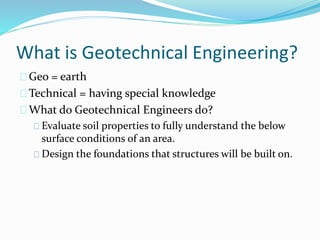All About Geotheta
All About Geotheta
Blog Article
The Ultimate Guide To Geotheta
Table of ContentsNot known Incorrect Statements About Geotheta The Ultimate Guide To GeothetaLittle Known Questions About Geotheta.About GeothetaSome Known Factual Statements About Geotheta

They conduct site examinations, accumulate samples, do research laboratory examinations, and assess information to assess the suitability of the ground for building jobs - Geotechnical Engineers. Based on their searchings for, geotechnical engineers offer referrals for structure style, slope security, retaining structures, and mitigation of geotechnical hazards. They work together with various other experts, such as engineers, architectural designers, and building and construction groups, to make sure that geotechnical factors to consider are incorporated right into the general task style and implementation
By evaluating the actions and properties of soil and rock, they can determine possible geotechnical risks such as landslides, soil negotiation, or incline instability. Their proficiency helps prevent failings or crashes that could threaten lives and home. Right here are some comprehensive duties and duties of a geotechnical engineer: Website Investigation: Geotechnical engineers conduct website examinations to gather data on subsurface problems.
They analyze the information to recognize the properties and actions of the soil and rock, including their strength, permeability, compaction characteristics, and groundwater problems. Geotechnical Evaluation and Layout: Geotechnical engineers evaluate the information accumulated during website examinations to analyze the stability and suitability of the website for building jobs. They execute geotechnical computations and modeling to evaluate variables such as birthing capability, settlement, slope security, lateral planet pressures, and groundwater flow.
Geotheta - An Overview
Foundation Style: Geotechnical designers play an essential role in developing foundations that can safely support the desired structure. They examine the soil conditions and tons demands to figure out the proper foundation kind, such as shallow structures (e.g., footings), deep structures (e.g (https://filesharingtalk.com/members/599923-geotheta)., piles), or specialized methods like soil enhancement. They consider elements such as settlement restrictions, birthing capacity, and soil-structure interaction to establish optimum structure styles
They review building strategies, screen website activities, and perform area evaluations to confirm that the design referrals are adhered to. If unanticipated geotechnical issues occur, they examine the circumstance and provide suggestions for remediation or modifications to the design. Danger Evaluation and Mitigation: Geotechnical designers evaluate geotechnical threats and threats connected with the project site, such as landslides, liquefaction, or dirt disintegration.

Partnership and Interaction: Geotechnical engineers function carefully with other professionals associated with look at here now a task, such as designers, architectural engineers, and building and construction teams. Reliable communication and cooperation are vital to integrate geotechnical factors to consider right into the overall project style and building procedure. Geotechnical engineers offer technological proficiency, answer queries, and make certain that geotechnical demands are met.
The Single Strategy To Use For Geotheta
Below are some kinds of geotechnical engineers: Structure Engineer: Structure designers specialize in designing and evaluating foundations for frameworks. They assess the dirt problems, lots demands, and site features to establish one of the most appropriate foundation type and design, such as shallow structures, deep foundations, or specialized methods like stack foundations.
They evaluate the variables affecting slope stability, such as dirt homes, groundwater conditions, and slope geometry, and create strategies to avoid incline failures and alleviate dangers. Earthquake Engineer: Quake engineers specialize in analyzing and designing frameworks to withstand seismic pressures. They evaluate the seismic threat of a site, examine soil liquefaction possibility, and establish seismic style requirements to guarantee the security and resilience of structures throughout quakes.
They do field screening, gather samples, and analyze the gathered data to identify the dirt buildings, geologic developments, and groundwater problems at a site. Geotechnical Instrumentation Designer: Geotechnical instrumentation engineers concentrate on surveillance and gauging the actions of soil, rock, and frameworks. They mount and preserve instrumentation systems that check aspects such as soil settlement, groundwater degrees, slope activities, and structural displacements to analyze performance and give early cautions of prospective problems.
The Best Guide To Geotheta
They perform examinations such as triaxial examinations, debt consolidation tests, straight shear examinations, and leaks in the structure examinations to gather data for geotechnical analysis and layout. Geosynthetics Engineer: Geosynthetics engineers specialize in the style and application of geosynthetic materials, such as geotextiles, geogrids, and geomembranes. They make use of these products to boost soil stability, enhance inclines, offer drain remedies, and control disintegration.
They often tend to be investigatory people, which suggests they're intellectual, reflective, and inquisitive. They are interested, systematic, logical, analytical, and logical. Some of them are likewise social, indicating they're kind, generous, cooperative, individual, caring, helpful, compassionate, sensible, and pleasant - Consulting Engineers.
In the workplace atmosphere, geotechnical engineers use specialized software devices to do computations, create layouts, and assess data. They prepare reports, testimonial task requirements, communicate with customers and group members, and coordinate job activities. The workplace setting offers a helpful setting for research study, evaluation, and collaboration with various other professionals entailed in the project.
Not known Incorrect Statements About Geotheta
They frequently check out project sites to perform site investigations, assess geotechnical problems, and gather data for evaluation. These sees involve taking a trip to various locations, occasionally in remote or challenging terrains. Geotechnical designers might carry out soil sampling, conduct tests, and monitor building activities to make sure that the geotechnical elements of the task are being applied correctly.
Geotechnical designers additionally function in specialized geotechnical laboratories. In these facilities, they conduct experiments, carry out examinations on soil and rock examples, and evaluate the engineering properties of the products. Geotechnical laboratory engineers work extensively in these settings, handling testing equipment, operating instruments, and tape-recording data. They collaborate with other laboratory staff to guarantee accurate and trustworthy testing results.
Report this page